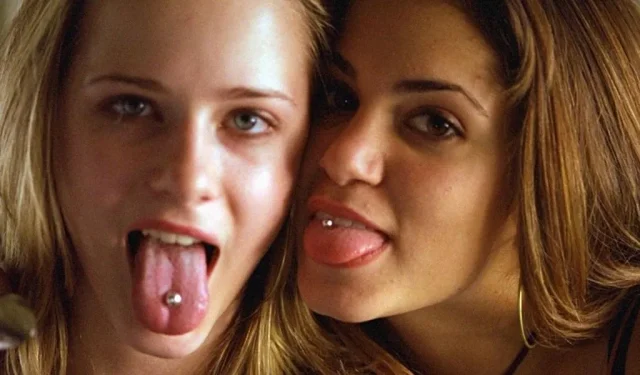Released in 2003, Thirteen set a new standard for coming-of-age films with its raw portrayal of adolescence. The screenplay, co-written by actress Nikki Reed, draws from her experiences as a teenage girl. It narrates the tumultuous journey of Tracy (Evan Rachel Wood), a seventh grader in Los Angeles who befriends a troubled classmate. Tracy’s exploration into drug use, sexual relationships, and self-harm delivers a gripping narrative that has influenced numerous dark coming-of-age films since.
Adolescence is an inherently complex time, marked by trials of self-discovery and maturity. Films like Thirteen successfully encapsulate the turbulence of this transitional phase. While the shift from childhood to adulthood can be fraught with challenges, viewers often find relatable elements in the multifaceted characters and narratives typical of the coming-of-age genre, which raises uncomfortable yet enlightening truths about growing up.
8 Stand By Me (1986)
Directed By Rob Reiner
Though often categorized as a quintessential coming-of-age film, Stand By Me delves deep into the themes of lost innocence. Set in the summer of 1959, the plot follows four boys—Gordie, Chris, Teddy, and Vern—on their quest to locate the body of a missing child. What begins as an adventure soon transforms into a profound journey, uncovering personal trauma, fear, and the harsher realities of life, as each character bears significant emotional scars.
The film’s strength lies in its exceptional casting, illustrated by Richard Dreyfuss’s compelling narration and the effective performances of the young actors, including the late River Phoenix. Stand By Me compels its viewers to confront mortality and the harshness of reality, offering a poignant examination of the transition from childhood to adulthood, moving beyond conventional narratives of romance or school milestones.
7 The Florida Project (2017)
Directed By Sean Baker
In The Florida Project, the central child character undergoes profound changes by story’s end. Directed by Oscar-winning filmmaker Sean Baker, the narrative centers on six-year-old Moonee, residing in a low-cost motel near Disney World with her struggling mother, Halley. Bobby, the motel manager portrayed by Willem Dafoe, plays a vital role in Moonee’s life, providing much-needed care and support.
Unbeknownst to Moonee, her seemingly carefree summer is shadowed by the harsh realities of poverty. As Halley resorts to sex work to make ends meet, Moonee is thrust into a world of adult challenges too soon. The film offers an unflinching yet vibrant look at childhood in a dire environment, with Florida itself acting as a compelling backdrop. Its striking visuals and poignant narrative resonate long after the film concludes, inviting viewer contemplation about the nature of childhood.
6 To Kill A Mockingbird (1962)
Directed By Robert Mulligan
Similarly to Thirteen, To Kill a Mockingbird tells the story of a young girl grappling with the painful realities of life. Adapted from Harper Lee’s iconic novel, the film is set in 1930s Alabama and follows young Scout Finch as her father, Atticus Finch, defends an innocent Black man, Tom Robinson, accused of a wrongful crime. The shocking truths of racial injustice unfold around Scout, forcing her to confront the realities of a divided society.
By the film’s conclusion, Scout astutely recognizes that morality exists alongside cruelty. This emotional and intellectual awakening marks her forced maturation, making the story a powerful exploration of childhood amid societal turmoil.
5 Eighth Grade (2018)
Directed By Bo Burnham
Bo Burnham’s Eighth Grade provides a stark portrayal of adolescence in today’s digital landscape. The film follows Kayla Day, an introverted 13-year-old navigating her final days of middle school, capturing the profound feelings of insecurity and despair that often accompany this stage of life. Kayla attempts to project confidence through her online persona while struggling to forge real-life connections.
This film highlights the dichotomy between the curated social media self and the often painful reality of adolescent experiences. Through its candid exploration of social anxiety, body image issues, and the quest for acceptance, Eighth Grade presents a heartfelt, unfiltered account of growing up, forcing viewers to confront the unsettling elements of youth.
4 Mid90s
Directed By Jonah Hill
Jonah Hill’s Mid90s explores the often harsh realities of growing up through the eyes of Stevie, a troubled 13-year-old boy in 1990s Los Angeles. Escaping a dysfunctional home life with an abusive brother, Stevie seeks acceptance among a group of older skateboarders. What begins as a search for belonging quickly reveals a world rife with drug use and reckless behavior.
Instead of romanticizing youth, Mid90s presents an unvarnished view of adolescence, depicting both the joys and the darker aspects of Stevie’s quest for connection and validation. The film’s raw authenticity sheds light on the complexities of growing up, often showcasing how peer pressure can lead young individuals down dangerous paths.
3 Boyhood (2014)
Directed By Richard Linklater
Boyhood, often recognized as a groundbreaking cinematic journey, chronicles the life of Mason as he transitions from childhood to adulthood over 12 years. Director Richard Linklater’s decision to film the actors at real intervals allows viewers to witness Mason’s authentic growth and the evolution of his family dynamics following his parents’ divorce.
As Mason navigates through the ups and downs of childhood, the film captures the essence of life’s emotional highs and lows, serving as a beautifully crafted tribute to the trials of growing up.
2 Are You There God? It’s Me, Margaret. (2023)
Directed By Kelly Fremon Craig
Are You There God? It’s Me, Margaret. beautifully balances lighthearted moments with underlying themes of darkness, presenting a significant coming-of-age narrative. This adaptation of Judy Blume’s cherished novel captures the journeys of 11-year-old Margaret as she wrestles with changes related to identity, puberty, and spirituality, feeling torn between two worlds.
Margaret’s struggle with her religious identity, alongside her experiences of puberty and social exclusion, conveys the complex pressures faced by young girls. The subtle emotional weight carried throughout the film speaks volumes about growing up and the burdens of expectation placed upon youth.
1 Moonlight (2016)
Directed By Barry Jenkins
Winning the Best Picture Oscar, Moonlight explores the intersection of identity, trauma, and masculinity through the life of Chiron, a young Black boy raised in a troubled Miami neighborhood. Structured in three distinct chapters—childhood, adolescence, and adulthood—this film poignantly traces Chiron’s struggles with poverty, bullying, and a drug-addicted mother amid his quest for self-acceptance.
Chiron’s journey reflects the burdens of silent suffering; he endures isolation and violence while navigating his sexual identity in an unwelcoming environment. By its conclusion, Moonlight reveals how Chiron’s experiences shape his adult identity, showcasing the heart-wrenching impact of social ostracization and emotional trauma on personal growth.
Much like Thirteen, the film’s atmosphere is thick with unspoken pain, making it a hauntingly beautiful testament to the challenges of growing up different in a world that often lacks compassion.


